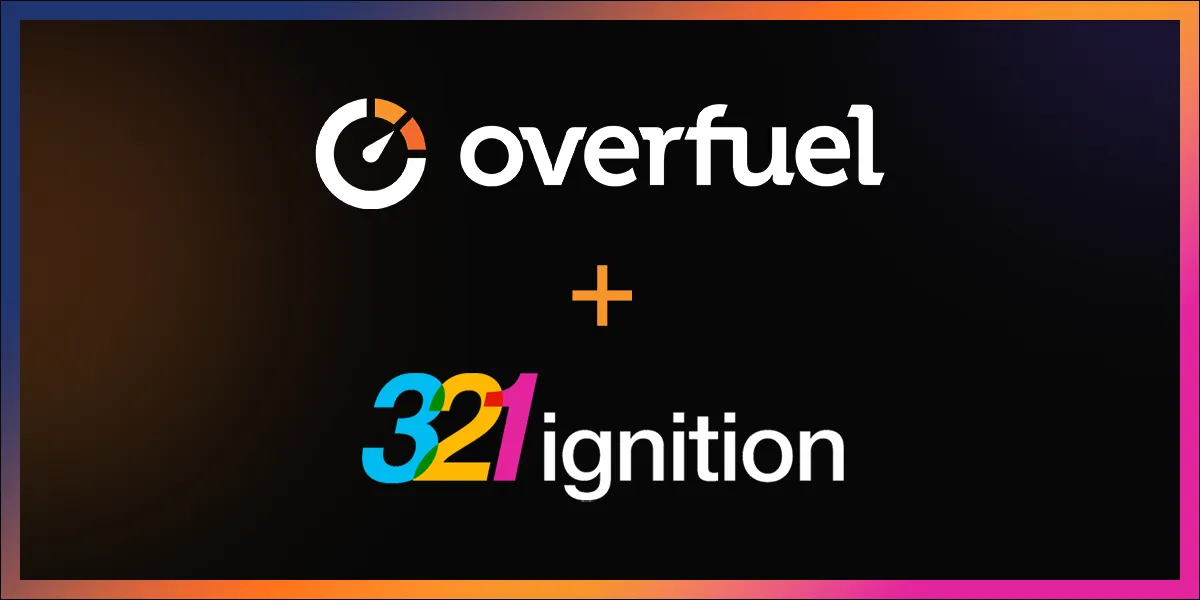Overfuel has acquired 321 Ignition, paving the way for a brighter future in digital showrooms
Ryan Pfenninger September 28, 2023

Overfuel has acquired 321 Ignition, paving the way for a brighter future in the automotive sales industry
The Overfuel team is excited to announce our acquisition of 321 Ignition, a mobile-first website platform for automotive dealerships. This strategic move is set to reshape the landscape of automotive retail, providing dealerships with cutting-edge solutions to enhance their online presence and customer experience (CX).
At Overfuel, we’re aiming to revolutionize the mobile-first automotive buying experience and empower dealerships with greater control. Instead of offering yet another plugin or website vendor, Overfuel provides an all-in-one solution that seamlessly consolidates every step of the customer journey. Our acquisition of 321 Ignition allows us to make CX even more seamless — for dealerships and their customers.
Addressing industry pain points with Overfuel
The automotive industry suffers from technological stagnation, especially in comparison to other digital-first markets. According to a benchmark report by Wattspeed, only 39% of automotive websites meet Google’s recommended speed standards on mobile devices, ranking the automotive sector second-worst in underperformance.
As car-buying goes increasingly digital, many buyers conduct the majority of their car shopping online. More than 80% of car shoppers access dealership websites through their mobile devices, so poor performance and slowness can significantly impact a dealership’s bottom line.
Poor performance also encourages customers to seek out third-party websites for information they could’ve received from a dealership’s website. Traffic to third-party automotive research sites is currently increasing 12% YoY (compared to a 2% decrease in dealership website activity YoY).
Sluggish websites not only affect search engine rankings but also result in lower conversion rates, higher pay-per-click advertising costs and potential damage to a dealership’s brand image. Overfuel’s focus on speed and CX aims to alleviate these pain points. Overfuel offers dealerships the following competitive advantages:
- No-code content management: Make simple website changes with Overfuel’s intuitive drag-and-drop editor. Eliminate reliance on third-party vendors.
- AI-enhanced inventory: Automate rich content creation with Overfuel’s ChatGPT integration. Ensure your inventory outranks the competition on search engines.
- Digital retailing: Overfuel’s all-in-one platform includes secure payment forms, document uploads and personalized payment calculators. Simplify the car buying process for consumers.
- Integrated lead capturing: Forms include finance pre-approvals, free credit score checks, instant cash trade-in offers, service scheduling and test drive scheduling. Enjoy effortless lead capture for a seamless transition from browsing to purchasing.
- Real-time analytics and marketing attribution: User-level analytics provide deep insight into consumer preferences, popular vehicles and the most effective traffic channels for generating leads and maximizing return on investment.
- Compliance: Overfuel customers are GDPR compliant, Google Analytics 4-ready and meet the standards of the Automotive Standards Council (ASC).
Stepping into the future of automotive sales and marketing
In addition to our strategic acquisition of 321 Ignition, Overfuel has secured a $500,000 pre-seed funding round led by Elevate Ventures. This capital injection will prove instrumental in expanding our onboarding and customer success team to support the 100+ customers we’ve signed since Overfuel’s pilot launch in March.
“From a technical standpoint, many of the market leaders in this space have been around for over 10 years and haven’t focused on continued innovation,” said Christopher Day, CEO at Elevate Ventures. “We saw an interesting opportunity with Overfuel to solve a massive industry problem. The leadership team has deep SaaS experience with a track record of building great software. We are excited about Overfuel’s growth opportunity.”
What’s next?
Our acquisition of 321 Ignition marks a significant milestone in the journey to transform the automotive retail industry. Overfuel is now poised to deliver rapid innovation, improved online experiences and a holistic dealership solution. As the automotive industry steps into its next chapter, Overfuel is at the forefront, redefining what’s possible in digital showrooms and automotive retail.